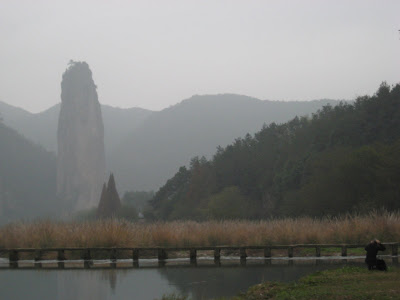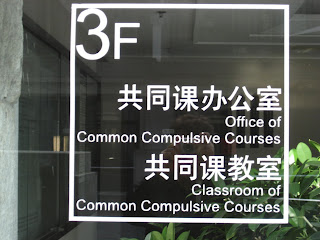To my surprise, many Chinese people had not heard of it. Many people I met in China simply had no idea where Lishui was. So I guess it was no surprise that, despite its size, the city was relatively remote (no local airport) and unfamiliar with Western faces. We were told that the Western group brought to the festival was the largest group of non-Chinese to ever be in the city. In fact, Westerners are rarely there at all (never more than 10 English speakers in the area at one time), so we were openly stared and pointed at. We were told that staring in Chinese culture is not the hostile act that it can be in the West, but some were still intimidated being treated so conspicuously as the Other. For myself, I found that a quick "hello" in Chinese and a smile broke the staring barrier. The awkward, silent stare dissolved into a huge grin with a returned "hello" every time. People seemed conspicuously delighted that we were there once the gawking barrier was broken. Schoolchildren, perhaps only knowing this one word in English, would call out "hello!" to us, and squeal with pleasure and delight when we responded back with a hello in either English or Chinese. Many participants were offered free food, free cab rides, and other spontaneous acts of generosity I would never expect in a dense metropolitan environment like this. People were simply friendlier and more innocently welcoming than in any other city I've been in my life. It's not fair or honest to make a generalization based on such a short and limited trip, I know. I was constantly aware that I didn't have enough information to fully understand the context of what I was experiencing. I felt like my eyes were wide open, but in fact I was peering at China through a very narrow slit in the curtains; what seemed to me to be a panoramic view was in fact edited and incomplete. That being said, I have never been more welcomed into a community where I was so conspicuously not of that community.
One example will serve well. I was invited to nominate 2 artists for the exhibition and bring one of them with me. I asked my friend, Christian Erroi, to be my companion (Cornelia Hediger was the other artist in the show. More on that in a future post). Christian is half Swiss and half Italian. We were walking around downtown looking for a bite of lunch when we saw a small line of local men taking away steaming buns from a hole-in-the-wall lunch counter. While we were standing there trying to decide if this would be the place, one of the guys in line said, "Come here! It's good! Come!". We were thrilled to hear even a few words of English hoping that we might actually be able to have an effortless transaction, but it became clear that we had just heard his entire English vocabulary.
Christian, when he's in a situation where there is no chance that the person he's speaking with will understand any language he knows, will lapse into Italian. I guess he thinks if tone, not words, is what is most important, he might as well speak in his most expressive language. So, he starts talking to the guy in Italian.....and the guy answers back in Italian! What are the odds in a city that hardly sees a Caucasian face that we'll meet a guy who speaks Italian? My own Italian is rusty but serviceable and Christian is a native speaker, so we launch into a real discussion with this guy. It turns out he's traveled some and spent time in Italy and studied the language. We ask him about the food, what's good, what's in it. he insists on ordering for us and making sure we have drinks and the next order of buns.
And here's where it really falls off the map in terms of my experience. We reach for our wallets to pay for lunch, and this guys says, "No. it's my treat". What? No, we insist, we can pay. We're happy to pay. "No. You are my guests", he replies. "We are so happy to have you in our city, it is my pleasure to invite you to lunch". We're speechless. Did we really just get treated to lunch by a total stranger who couldn't wait to have us sample his favorite pork buns? In Italian? In all my travels in the US and Europe, this was unique. I was humbled by this simple, unexpected, un-asked for act of generosity. Mind you, the buns were maybe 40 cents each, but that's 40 cents to us. I have no idea what the price of lunch represented to him in a country where one could very well earn $50 a month. Beautiful.
And people didn't just stare. We were endlessly photographed. If I ever wanted to have a taste of what celebrities feel in the face of paparazzi, this was my chance. Folks pointed cameras at us singly:

And in groups:

It seemed like any time I would look up, there was a huge lens pointed right at me:



But as with the stares, a simple "ni hau" would dissolve the moment into smiles and hellos:


We also seemed to be the object of touristic interest. Shortly after our bun experience, we were standing in front of a small shrine. A family group saw us and raced to have their picture taken with us in front of the monument:

More hurried to be part of the shot:

Ready?

No, the camera guy wanted to be in the shot, too, so he enlisted yet another guy to take the picture:

Now we're ready:

...and the happy picture:

Clearly, Christian knows a thing or two about posing to be a monument. But seriously, this group was just tickled to make this shot and wouldn't let us go until they got it right. We must have been there for 15 minutes. Not a word of English was exchanged, but Christian made himself well-understood in Italian.
The festival organizers made a point of taking us on some field trips to see the surrounding countryside. This was a mixed blessing. While it was a treat to see parts of China I would likely never see again, it took time away from the festival. I ended up not seeing all of the exhibits and failing to meet many of the Chinese artists. Our first trip was to the Zhutan Mountain Scenic Spot.

After seeing Dinghu Peak, I always referred to the day as "Picnic at Penis Rock" (apologies to Peter Weir).


There were no guides so I never learned much about Dinghu Peak, but I decided it probably wasn't Jewish.
Zhutan Park had my favorite "funny sign" of the trip:

But there were more to follow:



As fun as these were (and there were many), I was inspired to imagine what it would be like if the shoe were on the other foot. Can you imagine what a colossal screw-up it would be if the US were required to sign its national parks in Chinese?! Subways? Street signs? We, too, would be treated to the sight of Chinese people doubled over in laughter pointing at some innocuous sign. No question.
This perspective of asking myself what the equivalent experience in the US would be was constantly on my mind. If a busload of Chinese people who didn't speak any English were dropped off in Knoxville, or Boise, or Indianapolis, what reception would they receive? What if they went into a restaurant where there was not a single word on the menu in a language they could understand (as happened to us countless times)? What customs of ours that we take for granted would seem incomprehensibly strange to them? My pessimist side says that they would encounter a cool, suspicious US though, of course, I can never know. It's a hypothetical. Perhaps they wouldn't be treated poorly, but they could not be treated better than we were treated in Lishui. In a place that was as foreign to me as any place I've ever been, I was constantly welcomed and treated well.
As someone pointed out to me, China is a very old, very big, very complicated country. Any attempt to simplify, reduce, or generalize about one's experience is sure to miss the point or, worse, get it completely wrong. All I can say is that I was in one city for one week as an individual, English speaking man. I hope the microscopic sliver of light that I cast on the place illuminates a view that is somehow illustrative and not too off-the-mark in its assumptions. From street markets:

to the daily fish dinner being purchased:

to vistas that confounded my idea of a city:

To markets that were as I've never seen:
Lishui was an adventure I would not have missed for anything. Like my travels to the USSR and Eastern Europe in the late '80s, these are places in such a rapid state of change that if I came back in even a realtively short amount of time I wouldn't find the same place I visited a few weeks ago.
Coming up will be posts on:
Chinese artists exhibited at the Festival
Western artists exhibited at the Festival
Artists and galleries I saw in Shanghai
Stay tuned.....
Evan! how wonderful and funny a story. I love all the photos of people taking photos of you, that truly had me laughing out loud. best wishes on your travels. happy holidays,
ReplyDelete